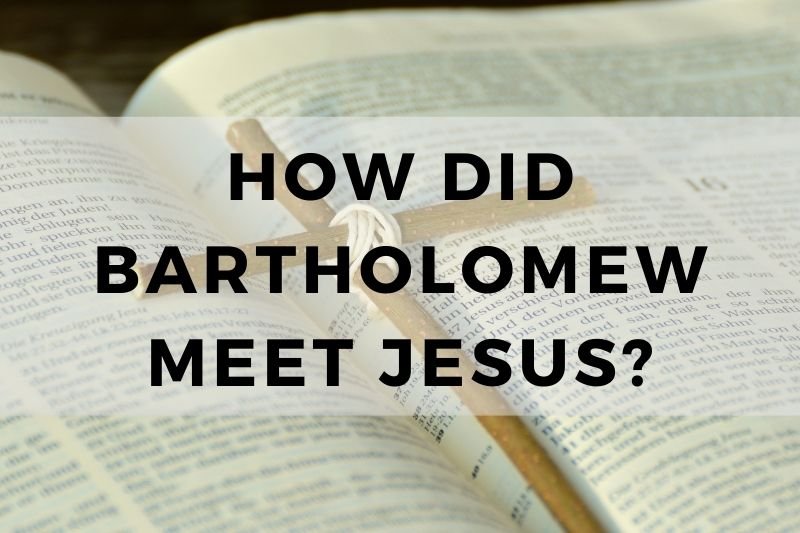
In examining the meeting between Bartholomew and Jesus, we analyze a crucial moment in biblical history. Bartholomew, often overlooked, played a pivotal role in the discipleship narrative. Understanding his encounter with Jesus sheds light on foundational aspects of Christian faith.
This article dives into the who, what, and why of this encounter, reviewing its significance in the broader scope of theological understanding. We’ll analyze scripture to learn how Bartholomew met Jesus, understand the meaning behind this encounter, and how it’s still applicable to modern-day faith journeys.
Who Was Bartholomew in the Bible?
Bartholomew, identified as Nathanael in the Gospel of John, emerges as a figure intertwined with the origins of Christian discipleship. Though not as prominently featured as some other disciples, his role in the Bible is nonetheless significant. Believed to be a native of Cana in Galilee, Bartholomew’s background remains somewhat obscure.
However, his association with Philip suggests a connection to the broader circle of Jesus’ followers. Despite sparse mentions in scripture, Bartholomew’s presence at key moments underscores his importance within the discipleship framework.
Delving deeper into his character and actions provides valuable insights into the dynamics of early Christian communities and the diverse backgrounds of Jesus’ followers.
How Did Bartholomew Meet Jesus?
Introduction by Philip
Bartholomew’s encounter with Jesus begins with an introduction by Philip, who excitedly proclaims, “We have found the one Moses wrote about in the Law, and about whom the prophets also wrote—Jesus of Nazareth, the son of Joseph” (John 1:45, NIV). Philip’s enthusiasm serves as the catalyst for Bartholomew’s journey towards meeting Jesus.
Initial Skepticism
Initially, Bartholomew exhibits skepticism regarding Jesus’ identity, expressing doubt with the question, “Nazareth! Can anything good come from there?” (John 1:46, NIV). This skepticism highlights Bartholomew’s cautious approach to accepting Jesus’ messianic claims.
Encounter with Jesus
Bartholomew’s skepticism is met with Jesus’ profound insight, as Jesus demonstrates supernatural knowledge of Bartholomew’s character and actions, declaring, “Here truly is an Israelite in whom there is no deceit” (John 1:47, NIV). This encounter marks the beginning of Bartholomew’s transformative journey.
Recognition by Jesus
In response to Jesus’ revelation, Bartholomew acknowledges Jesus as the Son of God and the King of Israel, proclaiming, “Rabbi, you are the Son of God; you are the king of Israel” (John 1:49, NIV). This recognition solidifies Bartholomew’s acceptance of Jesus’ divinity and sets the stage for his future discipleship.
The Significance of the Meeting Between Bartholomew and Jesus?
#1. Called by Jesus
Bartholomew’s encounter with Jesus initiates a profound calling to discipleship when Jesus simply says, “Follow me” (John 1:43, NIV). This straightforward yet powerful invitation signifies Bartholomew’s inclusion in the inner circle of Jesus’ followers. It marks the beginning of his journey as a disciple, illustrating Jesus’ deliberate selection of individuals to participate in his mission of redemption.
#2. Divine Revelation
Through his encounter with Jesus, Bartholomew experiences a divine revelation that transforms his understanding of Jesus’ identity. Recognizing Jesus as the Son of God and the promised Messiah (John 1:49, NIV), Bartholomew’s perception shifts dramatically. This revelation not only shapes Bartholomew’s personal faith but also underscores Jesus’ fulfillment of Old Testament prophecies and his role as the Savior of humanity.
#3. Recognition of Jesus as the Messiah
Bartholomew’s acknowledgment of Jesus as the Messiah carries profound theological significance. His declaration, “You are the Son of God; you are the king of Israel” (John 1:49, NIV), affirms Jesus’ divine nature and messianic mission. This recognition lays the groundwork for Bartholomew’s future ministry and proclamation of Jesus’ teachings, demonstrating the essential role of faith in discipleship.
#4. Symbol of Prejudice Overcome
Bartholomew’s initial skepticism, rooted in prejudice against Nazareth, serves as a symbolic representation of prejudice overcome through personal encounter and revelation (John 1:46, NIV). His journey from doubt to faith highlights the transformative power of encountering Jesus and embracing his message. It challenges believers to confront their own prejudices and preconceptions, opening themselves to the transformative work of the Holy Spirit.
#5. Establishment of Discipleship
Bartholomew’s acceptance of Jesus’ call to follow him establishes the foundational principles of discipleship within the Christian faith (John 1:43, NIV). His willingness to leave everything behind and follow Jesus exemplifies the radical commitment required of disciples. Bartholomew’s example inspires believers to prioritize their relationship with Christ above all else and to actively participate in the mission of spreading the gospel.
#6. Foundation of the Church
As one of the twelve apostles chosen by Jesus, Bartholomew plays a pivotal role in laying the foundation of the early Christian church (Matthew 10:2-4, NIV). His inclusion among the apostles underscores the importance of unity and collaboration in advancing God’s kingdom. Bartholomew’s ministry contributes to the growth and expansion of the church, serving as a model for future generations of believers.
#7. Symbol of Faith Journey
Bartholomew’s faith journey, from initial skepticism to unwavering devotion, serves as a powerful symbol of the transformative nature of encountering Jesus (John 1:45-49, NIV). His experience encourages believers to remain steadfast in their faith, even in the face of doubt and uncertainty. Bartholomew’s story reminds us that true faith is not static but dynamic, continually growing and deepening as we walk with Christ.
Closing Thoughts
The meeting between Bartholomew and Jesus encapsulates the essence of discipleship and the transformative power of encountering Christ. Through Bartholomew’s journey from skepticism to faith, we witness the universal invitation to follow Jesus and the profound impact of divine revelation on individual lives.
His story challenges us to confront our own doubts and prejudices, opening ourselves to the transformative work of the Holy Spirit. As we reflect on Bartholomew’s example, may we be inspired to wholeheartedly commit to following Jesus and participating in his redemptive mission, spreading the gospel message to the ends of the earth.
